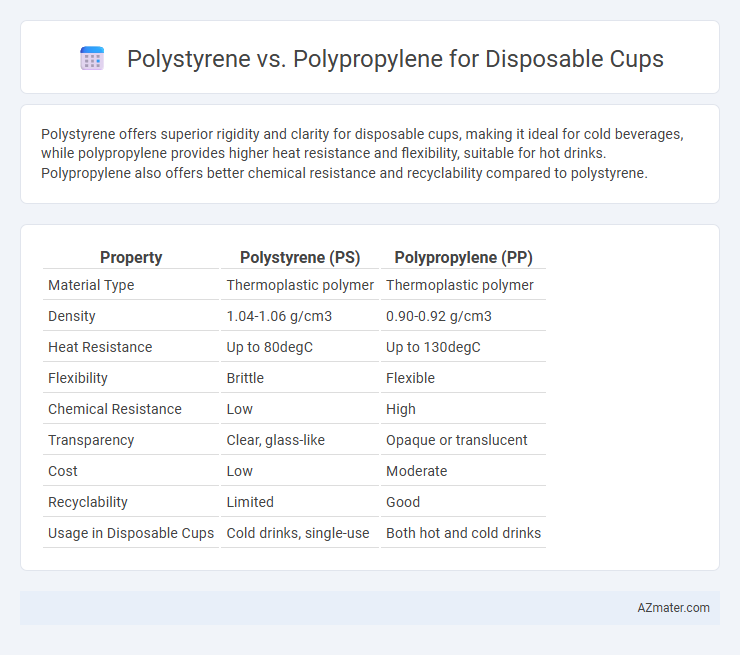Polystyrene offers superior rigidity and clarity for disposable cups, making it ideal for cold beverages, while polypropylene provides higher heat resistance and flexibility, suitable for hot drinks. Polypropylene also offers better chemical resistance and recyclability compared to polystyrene.
Table of Comparison
| Property | Polystyrene (PS) | Polypropylene (PP) |
|---|---|---|
| Material Type | Thermoplastic polymer | Thermoplastic polymer |
| Density | 1.04-1.06 g/cm3 | 0.90-0.92 g/cm3 |
| Heat Resistance | Up to 80degC | Up to 130degC |
| Flexibility | Brittle | Flexible |
| Chemical Resistance | Low | High |
| Transparency | Clear, glass-like | Opaque or translucent |
| Cost | Low | Moderate |
| Recyclability | Limited | Good |
| Usage in Disposable Cups | Cold drinks, single-use | Both hot and cold drinks |
Overview of Polystyrene and Polypropylene
Polystyrene is a rigid, clear plastic commonly used in disposable cups due to its excellent insulation properties and low cost, though it is less flexible and more brittle. Polypropylene offers greater durability, chemical resistance, and flexibility, making it suitable for reusable or more robust disposable cups that require heat resistance. Both materials are widely used in food service, but polypropylene's recyclability and heat tolerance make it a preferred choice for sustainable applications.
Manufacturing Process Comparison
Polystyrene disposable cups are produced through an injection molding process that allows for detailed shapes and smooth surfaces, offering excellent clarity and strength. Polypropylene cups, manufactured via thermoforming, provide higher flexibility and heat resistance, enhancing durability for hot beverages. The manufacturing speed for polystyrene is faster, but polypropylene's recyclability and chemical resistance make it more environmentally favorable in production.
Physical Properties and Durability
Polystyrene exhibits higher rigidity and clarity compared to polypropylene, making it ideal for transparent disposable cups, while polypropylene offers superior flexibility and resistance to impact. Polypropylene demonstrates better heat resistance, enabling it to withstand boiling liquids without deforming, whereas polystyrene can become brittle under thermal stress. In terms of durability, polypropylene's enhanced chemical resistance and toughness contribute to a longer lifespan in various conditions, whereas polystyrene is more prone to cracking and breaking under mechanical strain.
Heat Resistance and Safety
Polystyrene offers moderate heat resistance, suitable for serving cold or room temperature beverages, but it tends to deform and release harmful styrene compounds at high temperatures, raising safety concerns. Polypropylene exhibits superior heat resistance, maintaining structural integrity up to 120degC (248degF), making it safer for hot drinks without leaching toxic substances. The enhanced thermal stability and safety profile of polypropylene make it a preferred material for disposable cups intended for hot beverage use.
Environmental Impact and Recyclability
Polystyrene disposable cups, commonly used for their insulation properties, significantly contribute to environmental pollution due to their non-biodegradable nature and low recycling rates, often ending up in landfills or oceans where they persist for hundreds of years. Polypropylene cups offer a more sustainable alternative, as they are more easily recyclable within existing curbside programs and have a lower carbon footprint in production. Both materials pose challenges, but polypropylene's higher recyclability and reduced environmental persistence make it a preferable choice for disposable cups in efforts to minimize ecological harm.
Cost and Availability
Polystyrene disposable cups are generally cheaper due to lower raw material and manufacturing costs, making them highly cost-effective for large-scale, single-use applications. Polypropylene cups offer greater durability and heat resistance but come at a higher price point due to more complex production processes and raw material expenses. Availability of polystyrene cups is more widespread in the market given their long-standing use, whereas polypropylene cups are increasingly available but still less common in standard disposable cup inventories.
Suitability for Hot and Cold Beverages
Polystyrene cups offer excellent rigidity and insulation for cold beverages but tend to become brittle or deformed with hot liquids, limiting their suitability for high temperatures. Polypropylene cups demonstrate superior heat resistance and flexibility, making them ideal for both hot and cold beverages without warping or releasing harmful chemicals. For disposable cups, polypropylene is generally preferred for hot drinks due to its higher melting point and durability under heat.
Consumer Preferences and Market Trends
Consumer preferences for disposable cups reveal a growing inclination towards polypropylene due to its superior heat resistance and recyclability compared to polystyrene, which is often criticized for environmental concerns and brittleness. Market trends indicate a shift as manufacturers increasingly adopt polypropylene to meet sustainability demands and regulatory pressures, driving innovations in lightweight and durable cup designs. This transition aligns with rising consumer awareness regarding eco-friendly packaging and improved thermal performance in disposable cup options.
Regulatory Considerations
Polystyrene and polypropylene disposable cups face distinct regulatory considerations due to their chemical compositions and environmental impacts. Polystyrene is often restricted or banned in various regions because of its non-biodegradable nature and potential health risks from styrene monomer migration. Polypropylene cups generally comply with stricter food safety regulations and are favored for recyclability and lower environmental footprint, meeting standards set by agencies such as the FDA and EU's EFSA.
Final Verdict: Which Is Better for Disposable Cups?
Polystyrene offers superior rigidity and clarity, making it ideal for cold beverage cups, while polypropylene provides better heat resistance and durability, suitable for hot drinks. Polypropylene's higher melting point and recyclability give it an eco-friendly advantage over polystyrene, which is less environmentally sustainable due to its difficulty in recycling. For disposable cups, polypropylene is generally better due to its versatility, heat tolerance, and improved environmental impact.

Infographic: Polystyrene vs Polypropylene for Disposable Cup
 azmater.com
azmater.com